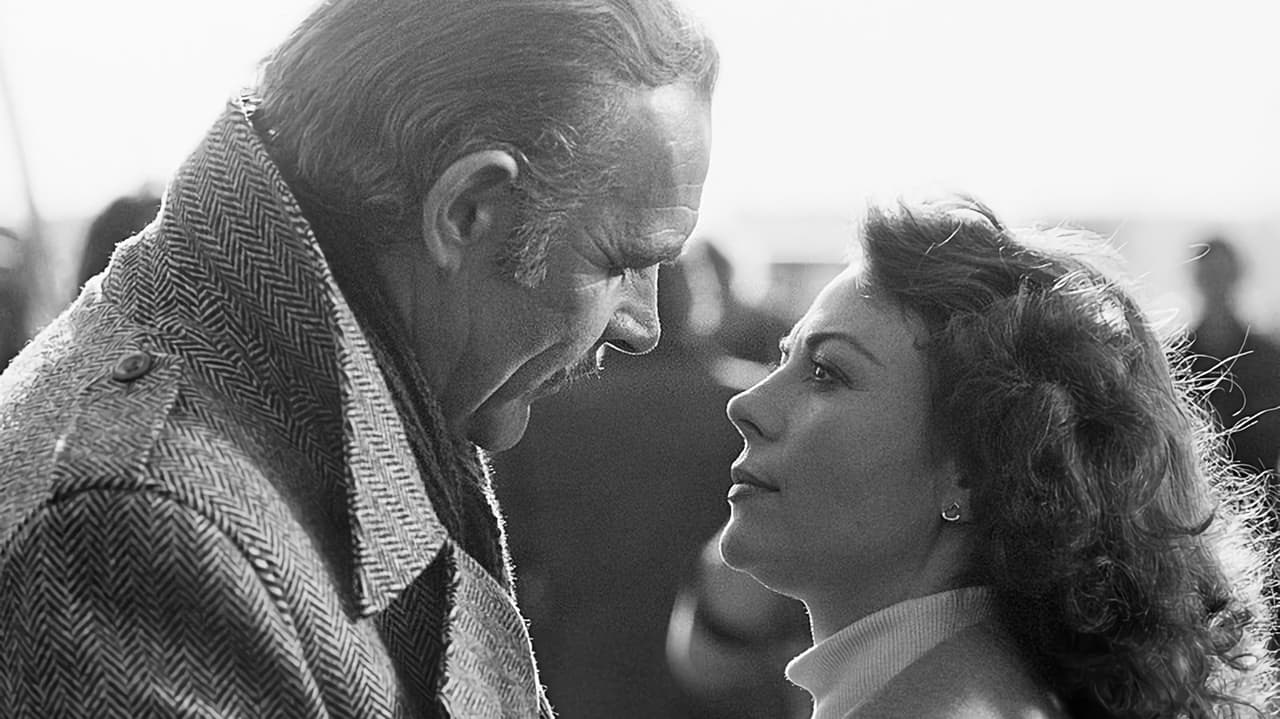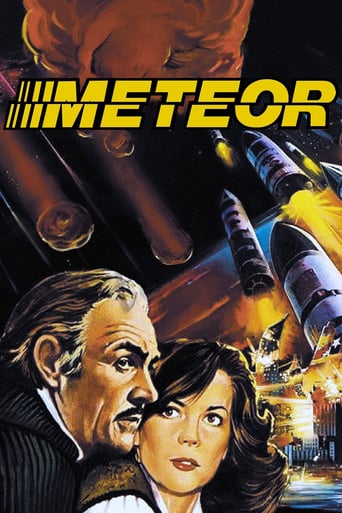MonsterPerfect
Good idea lost in the noise
Peereddi
I was totally surprised at how great this film.You could feel your paranoia rise as the film went on and as you gradually learned the details of the real situation.
Lachlan Coulson
This is a gorgeous movie made by a gorgeous spirit.
cinemajesty
At a time of declining demands for visual disaster on the silver screen, a sixteen-million-dollar-production brings together an star ensemble led by Sean Connery to join a Ronald Neame directed picture "Meteor". The 1970s, a decade starting out with high-budgeted shallow Hollywood movies as "Airport" (1970) and a better directed "The Poseidon Adventure" (1972) or "The Towering Inferno" (1974) envisioned by John Guillermin had been exploring the limits of on-set pyro- and hydraulic techniques to establish a realistic experience for the audience worth a ticket at the box office apart from the emerging Avantgarde of independent productions as "The French Connection" (1971) directed by William Friedkin.In the case of "Meteor" the expectations could hardly be fulfilled. A cast strapped to shut-in interior sets with an occasional exterior action sequence out of story-telling relevance beside the destruction itself. Director Roland Neame already finding his directorial peak with "The Odessa File" in 1974, coming from cinematographic backgrounds, did the job for hire to a doomed-to-fail script. When the previously mentioned disaster movies could count on physical elements as air, water or fire at hand to create destruction on a dosage, there had been "Meteor" in a hard-to-crack nut shell by cross-cutting into the distance of outer space in order to create a non-existing suspense for this particular picture.A picture totally relying on the native giving charms of its cast, Sean Connery kept his head high as the character of Dr. Paul Bradley in collaboration with stand-clear professionalism of actor Karl Malden in the role of Harry Sherwood, hiring the best of their fields to solve the problem of an approaching asteroid on collision course with earth. Director Ronald Neame tried hard to keep the story visually attracted enough for the audience with shifting camera movements within space-monitoring observation rooms.Nevertheless nothing could hide the fact that the spectators had been unable to identify with the approaching menace. A fact, which was picked up by J.J. Abrams in the 1990s to write the screenplay to "Armageddon" (1998), creating an enhanced story-line, where the star-spangled cast actually took on the death-bringing meteor heads on by getting rocket-shot into space. In retrospective, "Meteor" had been left alone as a relic of its time, the aftermath of an era of Hollywood disaster movies in the 1970s, which due to there high production costs paid the bills for every one involved.© 2017 Felix Alexander Dausend (for Cinemajesty Entertainments LLC)
utgard14
Americans and Russians must put aside their differences to fight meteors. Mediocre disaster flick with the obligatory "all-star cast" these things tended to have. Most of the cast, which includes big stars like Sean Connery, Henry Fonda, Karl Malden, and Natalie Wood, only marginally embarrass themselves. They can't do much with the poor script. The worst performance in the film comes from Martin Landau, who is so ridiculously hammy in this I'm surprised he ever worked again. The best performance is that of Brian Keith, who's very amusing as the Soviet scientist Dr. Dubov. The special effects are laughably bad at times. I could live with that if the rest of the movie weren't so damned boring. That's Meteor's biggest fault - it takes what should be an exciting, nail-biting premise and turns it into an uninvolving Cold War melodrama. To be clear, I don't hate disaster movies. There were a lot of entertaining movies of this type made in the '70s, when this fad was at its height of popularity. Unfortunately, Meteor isn't one of them.
SnoopyStyle
NASA pulls Paul Bradley (Sean Connery) off his yacht to stop a world ending event. Seven days earlier, a new comet was discovered. NASA's Harry Sherwood (Karl Malden) redirected the Mars mission Challenger II to intercept and observe its collision with the large asteroid Orpheus. Challenger II was destroyed. In six days' time, a large chunk is going to destroy the earth. The only hope is Project Hercules, a secret orbiting platform illegally armed with nuclear weapons. They need additional firepower from the secret USSR nuclear weapons platform. The Russians are led by Dr. Dubov (Brian Keith) and interpreter Tatiana Donskaya (Natalie Wood). The base is situated underground in NYC under the command of General Adlon (Martin Landau) who opposed the operation at every turn.This is Armageddon (1998) without the drillers. It certainly doesn't have the overwhelming Michael Bay sound and fury. It doesn't mean that this is any smarter. In fact, it might be even dumber. The good news is that it's not quite as overwhelming. Armageddon simply wore me out at some point. This one is a little boring with the missiles. There is a 70's disaster movie here in between the manufactured political battles and the flat story.
Will Bramca
I love those 70 disaster movies they're campy,clichéd with hammy acting and great entertainment on a rainy day and there were some really good ones like the Poseidon adventure ,Airport and the towering inferno so when I finally got around to meteor I was looking forward too it but something bothered me about this film the entire footage of the meteor hitting a ski resort was taken from another disaster movie released a year before called avalanche! That would be like Dante s peak using footage from volcano today! The rest of the film was what I expected for a disaster flick and I probably would have given it a higher rating but the fact that they recycled a key scene from another disaster film always bothered me even when time ran out and Airport 79 the Concord didn't do that.

